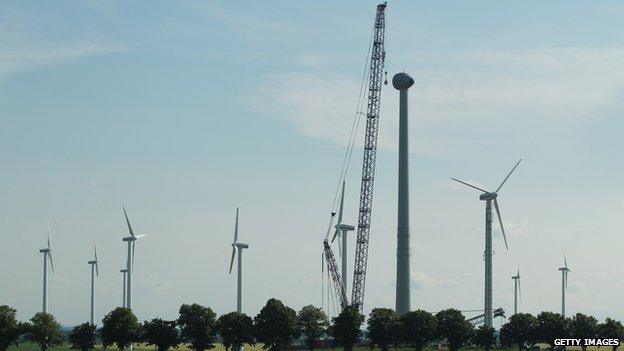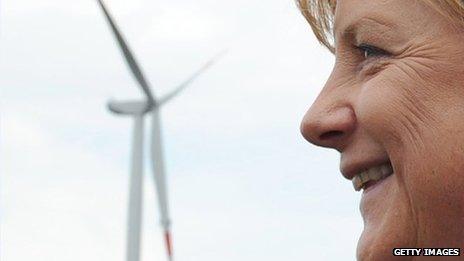Who pays for the greening of Germany?
- Published

Wind turbines have become dominant features of the landscape in many parts of Germany, which is also home to more than half of all the solar panels in the world
Germany is discovering that virtue comes at a price.
The country, one of the most industrialised on the planet, is undertaking an energy revolution.
Under what's called the "Energiewende", the economy is being re-engineered to cope with the closing of all its nuclear power stations and the ramping up of wind and solar power to fill the gap.
At the moment, renewable sources provide about a quarter of Germany's electricity supply but the aim is to raise it to 80% by 2050 - truly a green revolution.
But who pays for this boldness?
An argument has erupted because electricity bills for ordinary households have jumped. There's a debate over whether big industry should pick up more of the bill for the green switch. It's a debate that will get hotter in this election year.
There's also a debate over who is the father or mother of the revolution.
The initial decision to switch from nuclear was taken by the governing coalition of the Greens and the Social Democrats, the so-called Red-Green coalition.
But it was then reversed by Chancellor Angela Merkel - and then re-instated by her two years ago. A scientist by training and profession, she decided that the Fukushima disaster in Japan had revealed the true dangers of nuclear power so the calculations of risk had to be redone.
Consumers pay
At the time, governments of all stripes agreed that the switch to a green-source economy would be paid for by a surcharge on household electricity bills.

Germany saw mass protests against nuclear power after the disaster at Japan's Fukushima plant
It might have come out of general taxation, for example, but the decision was that consumers would pay.
Now, consumers are indicating they don't like paying, particularly as the surcharge has risen steeply.
"The largest amount that goes on investment in renewable energy comes from private households," says one of the country's leading energy economists, Professor Claudia Kemfert of the German Economics Institute in Berlin.
"More than 50% of the investment in solar and wind-turbines comes from these households."
Widespread exemptions
When the scheme was set up, heavy industry, which competes internationally, was exempted from the levy.
The argument industry made, and which was accepted, was that big steel companies, for example, or aluminium smelters competed internationally so if their energy costs were to rise substantially, the competition abroad would benefit - and there wouldn't have been much point in greening an economy if that meant crippling its biggest firms.
But more and more enterprises argued for an exemption from paying for the switch to green.
And it wasn't just big business.
Green activists argued that public transport companies should be exempt because these provided an alternative to the car. Their argument, too, was accepted.
"Almost everybody these days can get these exemptions," says Professor Kemfert.
"Private households then have to pay the rest and this is increasing and increasing, and that's unfair."
Generous incentives

Wind turbines have become a political headache for Chancellor Angela Merkel
On top of that, the government decided to provide generous incentives to companies or people who built wind-turbines or installed solar panels.
They're guaranteed a price - a feed-in tariff - for their electricity when they sell it into the grid for 20 years.
That's led to a countryside where wind-farms dominate landscapes. More than half of all the solar-panels in the world are now in Germany.
The thing is that the more solar panels and wind-turbines that are installed, the more the bill rises.
On one estimate, the surcharge which consumers pay has jumped by 50% in the past year, so the average German household pays 180 euros ($235; £155) to subsidise renewable energy.
Spread the burden
The biggest fans of the green revolution say that the spread of solar and wind is a mark of success. Those who are more sceptical say that the success comes at a price.
Germany's Energy Minister, Peter Altmaier, has now proposed putting a cap on the subsidy.
Whatever the merits of that, it is a neat political move in an election year where his party, the CDU, could be undone at the polls if the Green Party performs well.
If the Greens and the SPD campaign against the cap, they risk the wrath of voters who actually pay for it.
The Green MP, Hermann Ott, says that what needs to be done is to spread the burden more widely.
He thinks the number of exemptions is far too high, having mushroomed from just 50 or so at the start.
"Now we have almost 2,000 companies that are exempted and which have nothing to do with international competition at all.
"There are only a few companies that are exempted from this levy which are in direct international competition."
Political battleground
On top of that, power-generation companies have benefited greatly as the price of generating solar power has fallen.
Dr Ott says: "The current system is unfair because it provides about 30bn euros of windfall profits to the large energy companies at the expense of the ordinary consumer who has got to pay for it.
"So we've got a system at the moment which re-allocates wealth from the bottom to the top."
All of this is the difficult politics of ambitious change - the hard choices of implementation.
The speech and the decision in parliament is the easy bit, but with implementation come the conflicts and dilemmas to be resolved by politics - the rows over the routes of new pylons and cables, the arguments over who pays.
Nobody is calling for the green revolution to be reversed. There are no loud cries of regret that the route was taken.
"There is no way back," says Michael Wunnerlich, who's on the management board of the BDEW, which represents the electricity generation industry.
"It will be a success. There is huge support in public opinion. More than 70% are in favour."
What Germany is realising is that a brave decision to re-engineer its economy for the eventual good of all has costs. And it now has a lot of political debate about who should pay them.
- Published13 June 2012
- Published29 March 2012
- Published10 March 2012